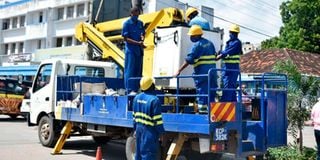Tsavo Power decommissions 75MW Mombasa thermal plant

Kenya Power technicians carry out repairs on an electricity line along Haile Selassie Road in Mombasa on December 5, 2020.
Tsavo Power Company is seeking to decommission its 75-megawatt (MW) thermal power plant located at Kipevu in Mombasa following the expiry of the firm’s contract with Kenya Power.
Tsavo signed a 20-year power purchase agreement (PPA) with the utility in January 2000, which ended in September 2021.
“The Company’s PPA in respect of the Plant came to an end in September 2021. Consequently, and in terms of the PPA, the Company now intends to fully decommission the plant in accordance with the conditions stated in the Company’s lease agreement with Kenya Power,” said the company in a notice.
The firm is now looking for a contractor to do the decommissioning of the plant.
“The Company, therefore, wishes to appoint a consultant to prepare the requisite studies and plans for the decommissioning of the plant as well as the tender documents to procure a contractor to execute the required decommissioning works, including the reinstatement of the leased land.”
Tsavo and Rabai Power Plant have been offering grid support to the local Coast grid given the area’s distance from the main power generation areas of the Seven Forks dams, the Rift Valley, and Northern Kenya.
The proposed decommissioning of the Tsavo plant comes at a time the presidential taskforce on review of PPAs had talked of the possibility of extending the firm’s contract but with improved terms to consumers to enable grid stability in case of generation shortfalls from other sources.
“In respect of Tsavo, examine the opportunity of retaining the plant (whose PPA has expired) at improved terms (for example, significantly lower tariff based on a cost-plus model and one-year or shorter tenors),” said the John Ngumi chaired taskforce.
The taskforce – which was formed in March 2021 and submitted its report in September of the same year- had temporarily also frozen the procurement of new IPPs.
The Cabinet however last month lifted the ban citing the need to increase the country’s power generation capacity.
The Cabinet says the move has been necessitated by the biting drought which has reduced the dispatch of hydroelectric power generated from the major dams and allows more IPPs to come and set up shop in the country to cushion the country from power supply hitches during future droughts.
Kenya Power says Kenya’s reserve margin - the amount of unused available power generation capability – is at just four percent and therefore onboarding new power generators to the grid is necessary.





